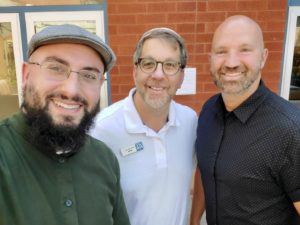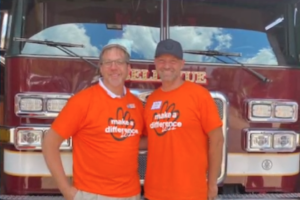Pastor Chris Griffin
Allison Park Church
Pittsburgh, PA
I was born and raised in Pittsburgh and I’m a part of Allison Park Church. I started attending Allison Park Church with my family when I was in the second grade. I went through the church’s ministry school and became a pastor when I was 21 years old.
In 2019, I was invited by Pastor Bob Roberts Jr. to travel with a group to Uzbekistan. We were there to experience firsthand the multi-faith relationships that were developing there, to see the relationships being built among the churches, pastors, Imams, and rabbis there. But among our group from America, we were also there to build relationships with clerics from other faith traditions from our communities in the US. I met Imam Kadir, from the Islamic Center of Pittsburgh, there and we began to develop a relationship together. Once we returned to Pittsburgh, we reached out to Rabbi Ron Symons. He could not go on the trip because of scheduling difficulties, but he was eager to begin a relationship. Unfortunately, as soon as we started to get to know each other, COVID-19 happened. Everything was locked down and quarantines occurred across the nation. This meant that the substance of our relationships was built through zoom calls and phone calls that we were able to have together. We were very intentional to build the relationship, even in the middle of the hardships that everyone was facing in those opening months of March, April, May, and June of 2020. Since that time Imam Kadir passed on the leadership to Imam Chris Caras, and we have worked to continue to build the relationship with Imam Chris now, as well.
 We purposefully get together frequently. We talk about our lives, we talk about our wives and our children. We also talk about our congregations and some of the things that we have in common such as funerals, weddings, and things that clergy all go through. We like to learn more about the differences and the similarities that we all face in leadership, in this space. And then at times, we talk about things that are intense in our world and our nation. Whether that’s the recent Supreme Court decision with Roe v Wade recently, or other hot button and current topics. We talk about enjoyable things, but we also at times get into intense discussions. The good news is that it has never become a discussion that is heated or argumentative. It’s always based on curious questions, getting to know one another, and getting to know the different perspectives that we each have.
We purposefully get together frequently. We talk about our lives, we talk about our wives and our children. We also talk about our congregations and some of the things that we have in common such as funerals, weddings, and things that clergy all go through. We like to learn more about the differences and the similarities that we all face in leadership, in this space. And then at times, we talk about things that are intense in our world and our nation. Whether that’s the recent Supreme Court decision with Roe v Wade recently, or other hot button and current topics. We talk about enjoyable things, but we also at times get into intense discussions. The good news is that it has never become a discussion that is heated or argumentative. It’s always based on curious questions, getting to know one another, and getting to know the different perspectives that we each have.
This past spring, Imam Chris as a part of Ramadan invited us to an Iftar meal. He invited a total of three pastors and two rabbis to come to the Islamic Center of Pittsburgh for dinner together. We ate together, we laughed together, we discussed and we talked and we had a great time together. It was great for me to see the community coming together with its congregation. It was a great experience for me. And it is always good to be with Imam Chis and Rabbi Symon in those kinds of spaces. They have genuinely become my friends.
One thing that makes this relationship work is knowing that all three of us have very strong beliefs about several different topics. It is critical to understand this. It allows us to ask questions. So instead of arguing, debating, or trying to prove each other right or wrong, we ask questions. We want to know where that comes from in each other’s sacred texts. Openness, learning, and curiosity are important to set the tone of that conversation, and the relationship. When the culture at large talks about these heated subjects whether it’s in the media, or on social media, it can get very intense, hateful even, and very defensive and argumentative. And we know that if the conversation gets into that area, it can be toxic, and break down the relationships that we’ve taken so many months and years to build. And so we value the relationship more than who’s right, who’s wrong, and the opinions, or even the scriptural perspective that any of us holds. We want to learn from each other and grow from each other and learn from the other person’s perspective.
 Recently, we have been working together, along with our local police departments and fire stations, to help connect houses of worship, and people of faith, with their local first responders. Our church, Allison Park Church, mobilizes the church every year to do a week of service projects, and kindness efforts; to reach out across the city of Pittsburgh. One of the projects that the campus I lead was hosting was a simple appreciation and thank you lunch for some local first responders. It was very natural for me to invite Rabbi Ron Symons to come to be a part because he had previously indicated an interest in this kind of work. At one fire department that we stopped at, we gave them lunch and Rabbi Ron spoke the blessing over the firemen and women, over their efforts, and their equipment. When we went to a police department, I was able to pray the blessing over the police officers. It is great to serve people in the community alongside Rabbi Symons, someone of a different faith. It was easy to invite him to join us and be a part of saying thank you to the fire and police departments because I know that is important to Ron. This was something that both of us were excited about. We had many people from our church that were there participating, so I was excited to continue to build that relationship with people that I’m close with, to see them get to know Rabbi Symons. And for him to also see our team as we were serving the community that day.
Recently, we have been working together, along with our local police departments and fire stations, to help connect houses of worship, and people of faith, with their local first responders. Our church, Allison Park Church, mobilizes the church every year to do a week of service projects, and kindness efforts; to reach out across the city of Pittsburgh. One of the projects that the campus I lead was hosting was a simple appreciation and thank you lunch for some local first responders. It was very natural for me to invite Rabbi Ron Symons to come to be a part because he had previously indicated an interest in this kind of work. At one fire department that we stopped at, we gave them lunch and Rabbi Ron spoke the blessing over the firemen and women, over their efforts, and their equipment. When we went to a police department, I was able to pray the blessing over the police officers. It is great to serve people in the community alongside Rabbi Symons, someone of a different faith. It was easy to invite him to join us and be a part of saying thank you to the fire and police departments because I know that is important to Ron. This was something that both of us were excited about. We had many people from our church that were there participating, so I was excited to continue to build that relationship with people that I’m close with, to see them get to know Rabbi Symons. And for him to also see our team as we were serving the community that day.
The first responders had some interesting responses. They noticed that a pastor and a rabbi were working together. They also noticed that we brought a lot of younger people with us to serve them. It brought one of the police officers to tears, to see teenagers saying thank you to these first responders. It was also important to show the first responders that we are unified in our work as an evangelical pastor and a Jewish rabbi.
For many of the teenagers in our church, it was the first time they had ever experienced multi-faith. They had never come together and worked with people of a different faith. For us, in Pittsburgh, these relationships are very new. But I also know that at their schools other students are Jewish, Muslim, Hindu, or other various religions. So, as a teen, the idea of having relationships with people different than them was not new, but working together as a person of faith, with someone of a different faith may have been new to them.
There are times that our political views are, let’s just be honest, very different. But we find that common ground to serve people, to serve the city to come together, to be friends, and to make a difference in our city. It’s awesome.
I think that a key takeaway for me that day is that sometimes we don’t have to create something new to become multifaith. We can take something that we’re already doing in our regular calendar and invite our friends to join us. That’s what Imam Caras did when he invited us to their Iftar meal. If we would stop and think ahead of time, we could do this more often.